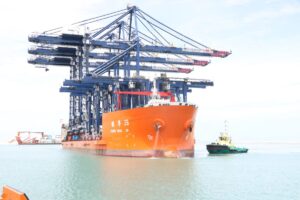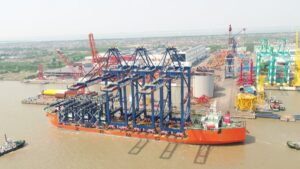Ahead of the expected operations of the Lekki Deep Seaport in September, three Ship-To-Shore (STS) cranes and 10 Rubber Tyred Gantries (RTGs) critical to the commencement of operations of the $1.5 billon Lekki Deep Seaport arrived in Nigeria on Friday.

The vessels came from Hong Kong, China.
Their arrival, according to Managing Director of the Nigerian Ports Authority (NPA), Mr Mohammed Bello Koko, represents a major step toward birthing Nigeria’s first Deep Seaport.
“It also demonstrates our readiness to take trade facilitation a notch higher,” Bello Koko said in a speech at the event he described as “epoch making”.
He said that the commitment of the NPA toward providing every support necessary to place Nigeria on the global list of countries with Deep Seaports was unflinching.
“This is why matters related to the operationalisation of Lekki Deep Seaport before the end of this year have been placed on top priority,” he declared.
The NPA helmsman thanked President Muhammadu Buhari and the Federal Ministry of Transportation for the tremendous backing the authority had enjoyed leading to the arrival of the vessel.

“For us at the NPA, the coming on stream of Lekki Deep Sea Port symbolises a lot of positives. Apart from being Nigeria’s first Deep Seaport, Lekki Port will also be the first fully automated port at take-off.
“This provides an insight into the path we are already toeing as a management team to govern the operationalisation of not just the forthcoming Badagry, Ibom and Bonny Deep Seaports, but also of the reconstruction of the aged Tin-Can Port, where work will commence immediately the transport ministry and FEC approve.”
He said that automation remained the most veritable tool for assuring port efficiency.
“As most of us are aware, the NPA is working assiduously under the technical guidance of the International Maritime Organization to deploy the Port Community System which will enable us respond squarely to the dictates of global trade facilitation and optimise the opportunities of the African Continental Free Trade Area (AfCFTA) Agreement to which Nigeria is signatory.
Read Also: Calabar Port Returns To Life As Vessel Berths After Three Years Of Inactivity
“Our strategic intent of becoming the maritime logistics hub for sustainable ports services in Africa rests heavily on how well we are able to deepen our efficiencies through a construction of deep seaports in order to leverage the concomitant benefits of economies of scale.”
Bello-Koko congratulated all stakeholders on the milestone and prayed for greater strides as the nation pushes toward trade facilitation.
Earlier, Chairman of Lekki Port LFTZ Enterprise Limited, Mr Abiodun Dabiri, had said that the arrival of the vessel was historic as it would begin to deliver Nigeria as a regional hub for maritime business.
“Now, the vessel we just received is carrying some major cranes and those cranes will enhance the transformation business of the deep sea port.
“The draft of the depth of this sea is about 16.5 meters and the vessel itself can only take about 14.5 meters; the implication of this is that there is no where else in this country that this vessel can berth and that is what makes it historic.
“So, in terms of efficiency, when you talk of STS crane, it means ship to shore which is devoid of manhandling; it will just be automated.
“It is going to be fully automated; it will transform the maritime business and make Nigeria a regional hub,” he said.
Kindly like us on Facebook















